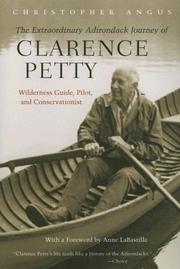| Listing 1 - 4 of 4 |
Sort by
|
Book
ISBN: 9780815654216 0815654219 9780815635550 9780815610939 0815610939 Year: 2017 Publisher: Syracuse : Syracuse University Press,
Abstract | Keywords | Export | Availability | Bookmark
 Loading...
Loading...Choose an application
- Reference Manager
- EndNote
- RefWorks (Direct export to RefWorks)
African Americans --- Afro-Americans --- Black Americans --- Colored people (United States) --- Negroes --- Africans --- Ethnology --- Blacks --- History. --- Adirondack Mountains (N.Y.) --- Adirondacks (N.Y.) --- History, Local. --- Black people

ISBN: 0815608942 9780815608943 0815608705 Year: 2015 Publisher: Syracuse University Press
Abstract | Keywords | Export | Availability | Bookmark
 Loading...
Loading...Choose an application
- Reference Manager
- EndNote
- RefWorks (Direct export to RefWorks)
Conservationists --- Environmentalists --- Scientists --- Petty, Clarence, --- Adirondack Park (N.Y.) --- Adirondack Mountains (N.Y.) --- Adirondack Forest Preserve (N.Y.) --- New York State Forest Preserve (N.Y.) --- Adirondacks (N.Y.) --- History.
Book
ISBN: 0801456282 9780801456282 9780801453526 0801453526 9781501704451 Year: 2015 Publisher: Ithaca London
Abstract | Keywords | Export | Availability | Bookmark
 Loading...
Loading...Choose an application
- Reference Manager
- EndNote
- RefWorks (Direct export to RefWorks)
In August 1858, William James Stillman, a painter and founding editor of the acclaimed but short-lived art journal The Crayon, organized a camping expedition for some of America's preeminent intellectuals to Follensby Pond in the Adirondacks. Dubbed the "Philosophers' Camp," the trip included the Swiss American scientist and Harvard College professor Jean Louis Rodolphe Agassiz, the Republican lawyer and future U.S. attorney general Ebenezer Rockwood Hoar, the Cambridge poet James Russell Lowell, and the transcendental philosopher Ralph Waldo Emerson, who would later pen a poem about the experience. News that these cultured men were living like "Sacs and Sioux" in the wilderness appeared in newspapers across the nation and helped fuel a widespread interest in exploring the Adirondacks.In this book, James Schlett recounts the story of the Philosophers' Camp, from the lives and careers of-and friendships and frictions among-the participants to the extensive preparations for the expedition and the several-day encampment to its lasting legacy. Schlett's account is a sweeping tale that provides vistas of the dramatically changing landscapes of the United States in the second half of the nineteenth century. As he relates, the scholars later formed an Adirondack Club that set out to establish a permanent encampment at nearby Ampersand Pond. Their plans, however, were dashed amid the outbreak of the Civil War and the advancement of civilization into a wilderness that Stillman described as "a not too greatly changed Eden." But the Adirondacks were indeed changing. When Stillman returned to the site of the Philosophers' Camp in 1884, he found the woods around Follensby had been disfigured by tourists. Development, industrialization, and commercialization had transformed the Adirondack wilderness as they would nearly every other aspect of the American landscape. Such devastation would later inspire conservationists to establish Adirondack Park in 1892. At the close of the book, Schlett looks at the preservation of Follensby Pond, now protected by the Nature Conservancy, and the camp site's potential integration into the Adirondack Forest Preserve.
Biography & Autobiography. --- HISTORY / United States / State & Local / Middle Atlantic (DC, DE, MD, NJ, NY, PA). --- Stillman, William James, --- Emerson, Ralph Waldo, --- Imarsana, Rāfa Vālḍō, --- Emerson, R. W. --- Emerson, Waldo, --- Emerson, R. Waldo --- Ėmerson, Ralʹf Uoldo, --- Ai-mo-sheng, --- Emarsan̲, --- אמרסון, רלף ולדו, --- עמערסון, ראלף וואלדא, --- Stillman, W. J. --- Adirondack Mountains (N.Y.) --- United States --- Adirondacks (N.Y.) --- History --- Intellectual life
Book
ISBN: 0520957938 9780520957930 9780520282292 Year: 2014 Publisher: Berkeley University of California Press
Abstract | Keywords | Export | Availability | Bookmark
 Loading...
Loading...Choose an application
- Reference Manager
- EndNote
- RefWorks (Direct export to RefWorks)
Crimes against Nature reveals the hidden history behind three of the nation's first parklands: the Adirondacks, Yellowstone, and the Grand Canyon. Focusing on conservation's impact on local inhabitants, Karl Jacoby traces the effect of criminalizing such traditional practices as hunting, fishing, foraging, and timber cutting in the newly created parks. Jacoby reassesses the nature of these "crimes" and provides a rich portrait of rural people and their relationship with the natural world in the late nineteenth and early twentieth centuries.
National parks and reserves --- Nature conservation --- Conservation of nature --- Nature --- Nature protection --- Protection of nature --- Conservation of natural resources --- Applied ecology --- Conservation biology --- Endangered ecosystems --- Natural areas --- National reserves --- Parks, National --- Reserves, National --- Parks --- Protected areas --- Public lands --- Forest reserves --- Military reservations --- National protected areas systems --- Social aspects --- History. --- Conservation --- 19th century american history. --- 20th century american history. --- adirondacks. --- american conservation. --- american history. --- american west. --- conservation. --- conservationists. --- crimes against nature. --- environmental history. --- fishing. --- foraging. --- grand canyon. --- history. --- hunting. --- john muir. --- local inhabitants. --- national parks. --- natural resources. --- natural world. --- nature. --- parklands. --- poachers. --- poverty. --- president roosevelt. --- rural people. --- squatters. --- teddy roosevelt. --- theodore roosevelt. --- thieves. --- timber cutting. --- united states of america. --- yellowstone.
| Listing 1 - 4 of 4 |
Sort by
|

 Search
Search Feedback
Feedback About UniCat
About UniCat  Help
Help News
News